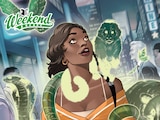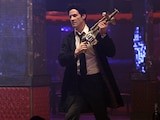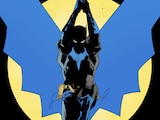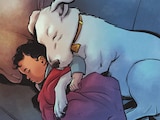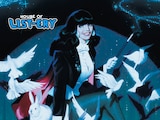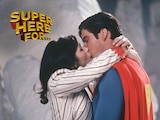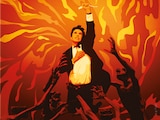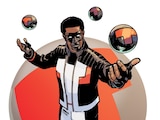The 1960s were a turbulent time for our world. While we thrilled to the music of the Beatles, TV shows like Star Trek and spy thrillers like the James Bond movies, outside the realm of entertainment, things were chaotic. America experienced a Presidential assassination, the torrent of the civil rights movement, a high-stakes space race, and the always looming threat of nuclear war. It was a difficult time for everybody, but what if they were Superman?
Superman: Space Age is a new limited series by Mark Russell and Michael Allred that places the Man of Steel smack dab in the middle of this pivotal decade. How does he react to the turbulent events going around him? And perhaps more importantly, how does a man with the power to change the world alter the course of its history? We recently had a chance to chat with the newly Eisner-winning Russell about his latest Superman tale and all the implications that come with setting it during such a consequential time.

What inspired you to set this story in the 1960s?
We wanted to show Superman as an evolving concept about how none of us come out fully formed as who we are. We're the source of influences, and the influences begin in our childhood. I wanted to show those influences and how characters like Jonathan and Martha Kent, and the holographic projection of Jor-El, as well as meeting Lois Lane for the first time, how these things helped make Superman into Superman. He didn't just come out fully formed from the head of Zeus.
I love the contrast between Superman's relationship with both of his fathers. What was your take on that?
One of Superman's great powers, which never really gets talked about much in the comics, is his ability to listen. How he absorbs the wisdom of others, and lets it become part of him. How he takes the best attributes of other people and uses them to grow, without which he would be an absolute terror. You don't want somebody in power who doesn't have that ability to listen and to grow and to respect the wisdom of others. So, I wanted to really make that an important part of his development in this first volume.

Superman comics were published in the 1960s, but they didn’t lean into contemporary events the way this story does. How did these events shape your version of the character?
In the ’60s, it's not like they knew they were making a comic book about the ’60s. They just thought they were making a comic book set in some generic present, whereas now we acknowledge what was important about that decade's history. And that's what I wanted to write about in large degrees, like what it would mean to be a good person in the throes of history. What it means to be good and have that good actually matter. And I think that's where the events of the ’60s—the arms race, the civil rights movement and the Cold War paranoia—comes into play. It's like giving Superman the challenge of figuring out what it means to be good in a world that is spiraling out of control.
This comic also has an interesting role for Lex Luthor. How did you come up with this interpretation of him?
The book begins with the Kennedy assassination and a near nuclear miss that follows immediately after, and I wanted that to be sort of the Rorschach print to which all the other main characters become responses to. Superman sees that happen and he says this world is in danger and it needs someone to save it. Lex Luthor sees it and he thinks this world is on its way out, so I need to make sure I grab as much as I can and bury myself underground as deep as I can before it all implodes. And Batman sees it and thinks this is the consequence of the elites thinking they're above everything and someone needs to be thinking about the people on the ground, and the space age is going to be what gets us all killed. I very much wanted the events of the ’60s, in particular the Cold War paranoia, to be what drives the character development of the other characters, including Lex Luthor, who is basically convinced that the world is coming to an end and that's a wonderful profit opportunity.

Journalism plays a major role in this story. Can you talk about Superman’s relationship with the medium?
Superman's catchphrase historically has been truth, justice and the American way. But I feel in a lot of ways, the institution that has embodied that the most has been journalism. It's about telling the truth, standing up to power and using our historic freedoms of the press, as real or imagined as they have been in the past, to mean something. It's really in that way that Lois kind of becomes the biggest influence on Superman, because he sees the courage it takes to tell the truth to power and to go out and report on wars and events without being bulletproof. That sort of courage is what he, somebody who is impervious to danger, should at the very least aspire to.
I love that Lois was writing the Kooks and Kranks column. It reminded me of her debut in Action Comics #1 where she was responsible for writing “sob stories.”
I definitely wanted her to start like she did in the Golden Age where she's doing the sort of human interest or ladies journal-type pieces and then gets thrust into the biggest story of her generation: the Kennedy assassination. That's where she makes her name. But I also wanted that Kooks and Kranks article to become important to the story in that one of the Kooks and Kranks turns out to be the Pariah, who is not a Kook or Krank at all—he's telling Superman, in a very real fashion, what's going to happen to the world. I like using that for dual purposes.

This story also features other superheroes like Batman and Wonder Woman. What was it like to craft your own version of the DC Universe?
It's definitely a Superman story, but I wanted it to be about how Superman is sort of the product of all the people around him, and about how as the symbol of hope, what you hope to accomplish is that other people will be drawn to it. Other people will follow or at the very least will try to also create hope where they can. That's really what this story is about, and that is where the rest of the Justice League and the DC Universe comes into play.
Did Superman IV: The Quest for Peace ever enter your mind while you were writing this?
Against my will, yes it did. Especially in the end when there's the nuclear crisis. I am not going to say I'm a fan of Superman IV, but there are a lot of nods in this book to both the films and the past Superman comics. That might have been an unintentional Easter egg on my part.

Michael Allred’s art is gorgeous. Can you tell us what it was like to collaborate with him?
Mike is a very rare auteur artist, and I knew that when he was onboard that this was going to be something special. And I knew also that I should probably just give him as few notes as possible and just let him dazzle me with the artwork. Let him make me seem smarter than I am, and that's kind of what our relationship has been. I'll give him the script, and if he wants to ignore my panel breakdowns and come up with his own page ideas, I just let him because I know it's going to be better than what I told him to do.
How would you pitch this book to somebody that hasn't read a Superman comic in five or ten years?
I would say it's about the need for hope in a world without it. I think if you're a Superman fan, you're going to get that. If you're not a Superman fan, you probably need to get that.
Superman: Space Age #1 by Mark Russell, MIchael Allred and Laura Allred is now available in print and as a digital comic book.

